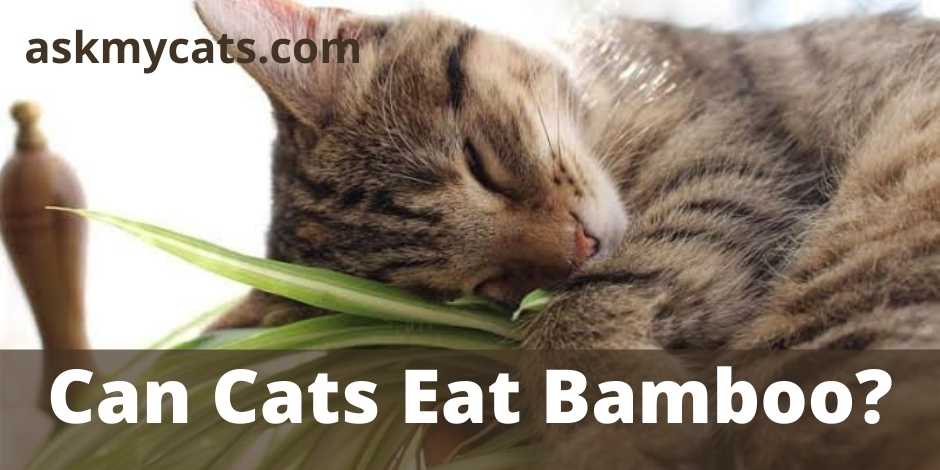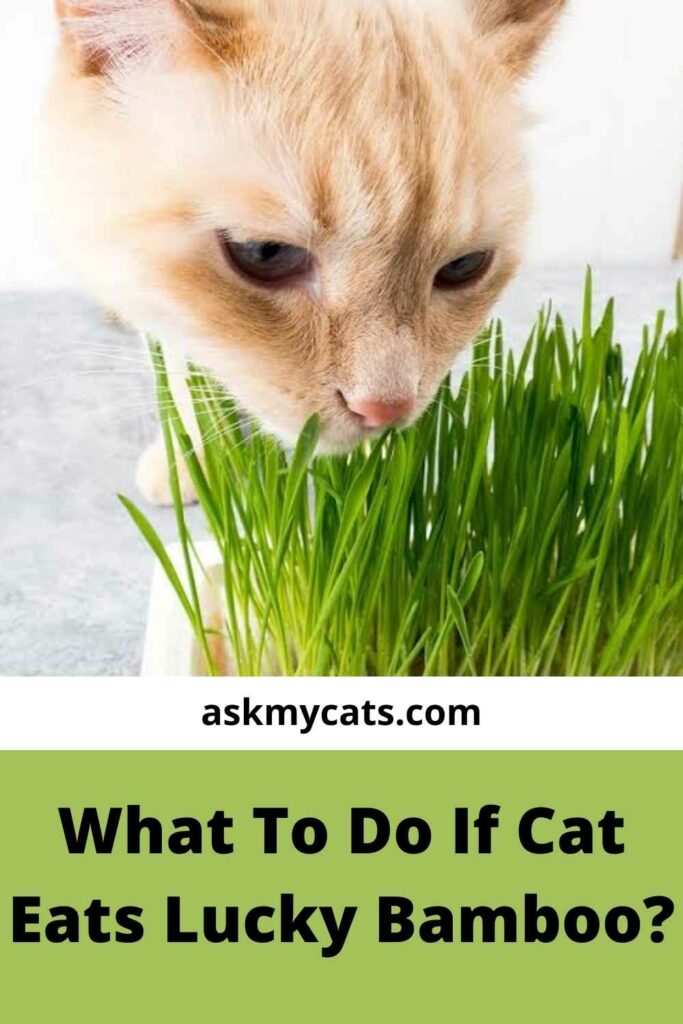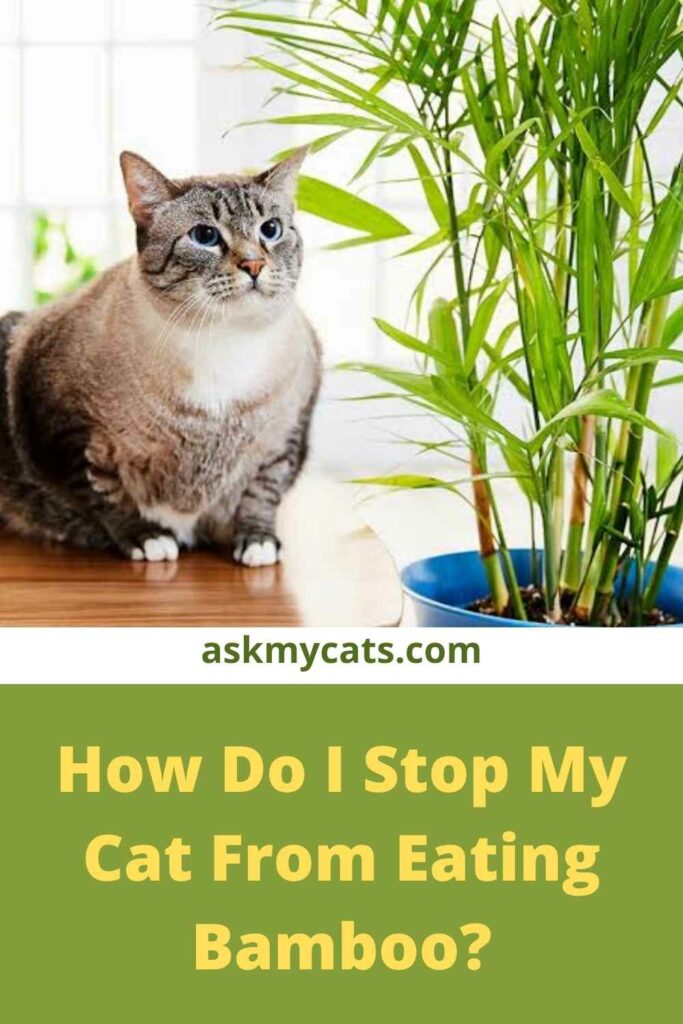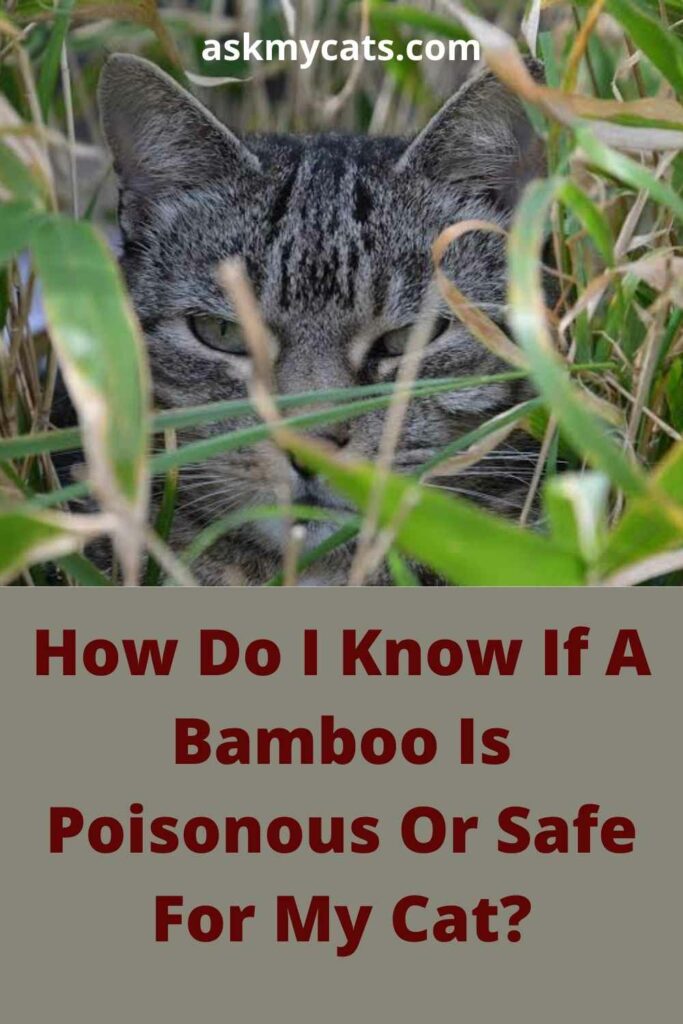Yes, cats can eat bamboo. This, however, only refers to true bamboo species, not imitations such as “Lucky Bamboo” or “Heavenly Bamboo.”
There are several species that carry the name bamboo but are not actually bamboo. Dogs, cats, and horses are not poisoned by genuine Bambusoideae bamboo species.
Bamboo foliage contains up to 22 per cent protein, making it suitable for cats. Protein concentration varies from species to species, as well as by the age of the leaves. The protein content of late-season foliage is significantly higher than that of newly produced foliage.
Fertilization is a concern with bamboo. Bamboo should be fertilised twice a year, once in the spring and once in the fall.
Most fertilizers include chemicals that might damage your cat’s health if they consume them. So, be careful about the type of fertilizer you use.
If you want to know more about cats and their relationship with bamboos, keep reading!


Give Your Cat the Perfect Day
Get the Free Ebook!
Is Bamboo Toxic To Cats Or Safe?
While the American Society for the Prevention of Cruelty to Animals (ASPCA) declares bamboo to be non-toxic, this is only true for a handful of the most common bamboo varieties. Bamboo comes in a variety of kinds, some of which are toxic to cats and others which are totally harmless.
We’re here to assist you to understand the situation and determine what would work best for your cat and what you should avoid.
True bambusoideae bamboo species are non-toxic and deemed safe for cats. The bambusoideae family of plants is mostly cultivated outdoors, which is where your cat is most likely to go.
Kittens will have no trouble playing in the greenery and imagining themselves strolling through a forest. They’re also a lot of fun for cats to play with.
Can Cats Eat Bamboo Plants?
In between meals, some cats love nibbling on the leaves. It’s possible that they’ll get sick and vomit if they consume too much, but don’t worry; bamboo is one plant that isn’t poisonous to cats, even if they eat too much.
Cats may naturally experiment with the taste of houseplants due to their proclivity for seeking and ingesting plants. When leaves or other plant components are poisonous, such behavior might be unwelcome at best, and deadly at worst.
As a result, ensure that the bamboo in your home is of a safe variety. If it is, it will not be an issue if your cat chews on it.
Is Bamboo Palm Toxic To Cats?
Where the air is humid and the sun is bright, the bamboo palm, also known as the reed palm, grows naturally in Mexico and Central America.
Because it is one of NASA’s Clean Air types and is harmless to dogs, cats, and people, the bamboo palm is a favorite indoor plant.
Its glossy green leaves could be appealing to a plant-loving pet, and that’s okay. Cats are safe around bamboo palm plants. It’ll cheerfully and safely enjoy the sunny window seat with your cat or serve as the ideal canopy for your cat’s bed.
Can Cats Eat Lucky Bamboo?
According to the ASPCA, Dracaena Sanderiana (lucky bamboo or ribbon plant), can be hazardous to cats. It produces dilated pupils, stomach discomfort, increased heart rate, and drooling in cats when consumed.
Ingesting lucky bamboo causes sadness, a lack of appetite, drooling, vomiting, incoordination, and frailty in cats. If you suspect your cat has consumed lucky bamboo, contact your veterinarian for advice on how to deal with the poison.
Is Lucky Bamboo Toxic To Cats?
While we think of Lucky Bamboo as a symbol of happiness and wealth, our cats don’t always view it that way.
This plant’s leaves have a low degree of toxicity, which might be detrimental to your home cats. Symptoms, on the other hand, are usually minor.
You’ll want to keep an eye out for Lucky Bamboo shoots. They’re reported to contain taxiphyllin and saponins, which are more irritating than the leaves themselves.
However, this seems a lot worse when you realize that cats don’t usually consume plant stems and shoots. Yes, you may occasionally catch them swatting a leaf or two, but your cat is unlikely to ingest any of the plant’s components.
What To Do If Cat Eats Lucky Bamboo?

If your cat has eaten some lucky bamboo, you may observe the following symptoms:
- Vomiting
- Weakness
- Seizures
- Coma
- Depression
- Excessive drooling
- Dilated pupils
- Coordination issues
- Breathing difficulties
- Lack of appetite
If your cat is exhibiting these signs, it’s time to schedule an appointment with your veterinarian. Remember that the severity of your cat’s symptoms will be determined by how much of the plant she has consumed.
For example, if she merely took a minor nibble at a leaf, her symptoms will be minor. Although this is not an emergency, it is still a good idea to contact the veterinarian.
Your cat’s symptoms, on the other hand, will be exacerbated if she eats a significant amount of the fortunate bamboo. This might be a medical emergency, so contact your veterinarian immediately.
The good news is that cats who receive medical care as soon as possible will recover completely. Cats with little symptoms will also be fine, however, we still recommend a visit to the veterinarian.
Can My Cat Die From Eating Lucky Bamboo?
Although lucky bamboo is claimed to be non-toxic or healthy for people, it has been discovered to be very poisonous or dangerous to pets.
The ASPCA’s Poison Control Center has classified lucky bamboo as a hazardous chemical. It is not safe for cats, dogs, or other animals to consume. Even in people, this is known to produce stomach discomfort.
When you see negative symptoms in your cat, you should take them to the nearest veterinarian or medical professional.
Because cats don’t eat leaves or plants in general, owning a lucky bamboo plant for both indoor and outdoor use can be safe.
You should, however, keep a close eye on your cat’s behaviour.
The lucky bamboo’s stalks or shoots are claimed to contain a cyanogenic glycoside called taxiphyllin, as well as saponins, which can cause cyanide poisoning if consumed.
What Happens If A Cat Eats Bamboo?
If your cat ingests a hazardous bamboo plant, it will most likely have mild to moderate toxic poisoning symptoms.
Fortunately, a cat’s body is aware of the situation. When their stomachs detect an unpleasant or poisonous substance, they will strive to regurgitate it as fast as possible.
If your cat has consumed a significant amount of bamboo, the following adverse effects are common:
- Nausea
- Vomiting
- Abdominal pain
- Diarrhea
- Dilated pupils
- Anxiety
- Drooling
- Weakness
- Lack of coordination
It’s difficult to figure out what’s wrong with your cat because most people aren’t experts on houseplants or poisoning. Making the right diagnosis might be difficult, therefore, it’s always advisable to take your cat to the doctor and express your worries if you notice that your cat isn’t feeling well and exhibits any of these symptoms.
Do Cats Like Eating Bamboo?
In between meals, some cats love nibbling on the leaves. It’s possible that they’ll get sick and vomit if they consume too much, but don’t worry; this is one plant that isn’t poisonous to cats, even if they eat too much.
Bamboo is one of the numerous indoor cat-friendly plants. Therefore, even if your cat eats or chews on it, she will be safe.
How Do I Stop My Cat From Eating Bamboo?
Follow these tips to stop your cat from eating bamboo:

1. Make Your Plants Smell Bad To Your Cat
Cats are extremely sensitive to odor. Making your plants smell unappealing is one of the simplest methods to discourage them from eating, digging, or otherwise interacting with them.
There are a few natural methods to accomplish this:
Citrus repels cats, so try putting a lemon peel or two in the soil of your plants, but avoid using strong citrus oils, since they can be poisonous. Cayenne pepper can also be sprinkled around a plant. Your cat will back off for good after one whiff.
2. Spray The Leaves Of Your Plant
Over-the-counter pet sprays that are particularly designed to keep pets away from houseplants are reasonably easy to come by. They’re created with non-toxic chemicals, but you should always consult your veterinarian before giving your cat any medication.
You may also combine 1 part vinegar with 3 parts water and spray straight on your plant’s leaves as an option. Cats will not like the smell and hence, they will not come near your plant.
3. Place Your Plants Strategically
Keeping your plants in the most off-limits section of your home, if feasible, is the easiest method to keep your cat at bay. Bedrooms, baths, and even sunrooms benefit from natural light.
If that isn’t an option, consider placing plants high enough that your cat won’t be able to reach them. You could hang them in baskets. Your best method for keeping the plants cat-free is to make them as inaccessible as possible.
Just remember to hydrate them.
Can Cats Drink Bamboo Water?
Yes, cats can drink bamboo water. It’s not at all harmful, in fact, it’s beneficial.
As long as the bamboo is healthy, it removes pollutants and contaminants from the water supply.
How Do I Know If A Bamboo Is Poisonous Or Safe For My Cat?
In order to determine whether a bamboo plant is safe for your feline or not, you must know their scientific name.
Bamboo Plants Poisonous To Cats

1. First Type
Scientific name: Dracaena Sanderiana
Common name: Lucky Bamboo, Ribbon Plant
2. Second Type
Scientific name: Nandina Domestica
Common name: Heavenly Bamboo, Sacred Bamboo, Nandina
Bamboo Plants Safe To Cats
1. First Type
Scientific name: Phyllostachys Aurea
Common name: Bamboo, Golden Bamboo, Fishpole Bamboo
2. Second Type
Scientific name: Smilax Walteri
Common name: Red Berried Bamboo
3. Third Type
Scientific name: Chamaedorea Elegans
Common name: Good Luck Palm, Bamboo Palm, Reed Palm
4. Fourth Type
Scientific name: Smilax Laurifolia
Common name: Bamboo Vine, Blaspheme Vine
If you’re afraid about your pet getting poisoned by a plant, it’s best to avoid the hassle and buy one you know is completely safe to keep around the house.
Frequently Asked Questions
Are Bamboo Plants Poisonous?
Not all bamboo plants are poisonous. Some of them, like lucky bamboo, may be poisonous.
Can Bamboo Hurt Cats?
Bamboo is not harmful to cats, unlike many other common plants. Housepets are not harmed by bamboo.
Will Bamboo Make Cats Sick?
Dracaena Sanderiana (lucky bamboo or ribbon plant), according to the ASPCA, can be hazardous to cats. It produces dilated pupils, stomach discomfort, increased heart rate, and drooling when consumed.
Final Words
Growing non-toxic bamboo in the yard may be a fantastic way to add color and depth to your living space if you’re a bamboo fan. Your cat is sure to enjoy it as much as you do.
However, make sure that the bamboo you grow is of the safe kind. If you notice any of the negative symptoms we mentioned in the article, consult a veterinarian immediately.
If you have any more queries regarding your feline friend, drop them in the comment section below.
